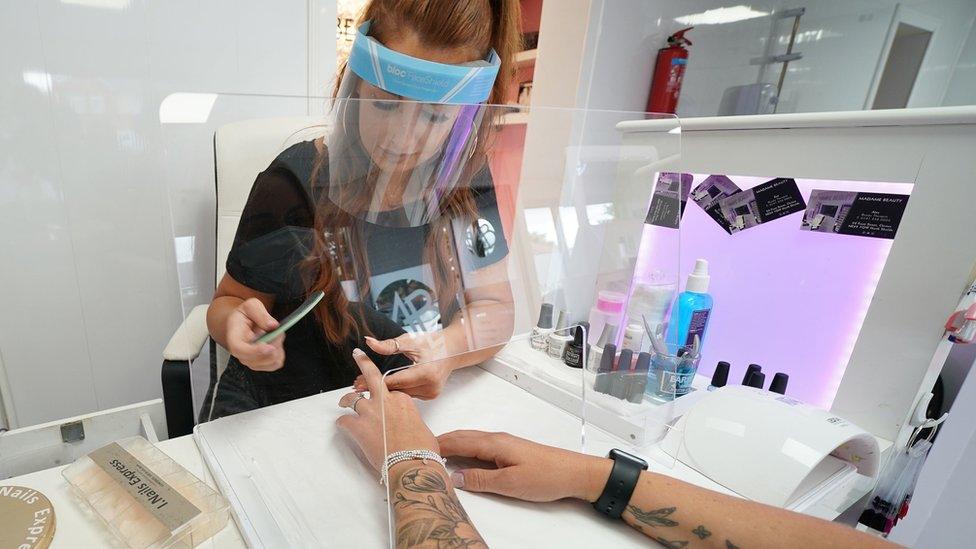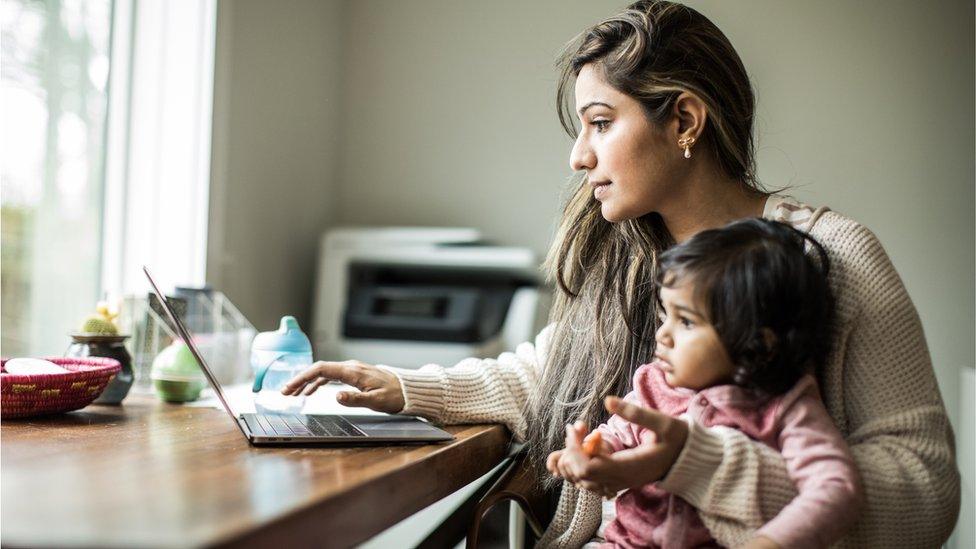International Women's Day: Women's work during the pandemic
- Published

The pandemic has had widely varying effects on different generations, races, nations, sectors and genders. Nearly a year in, the data shows women in the UK have not been more likely to lose their jobs, but they have been harder hit in many other ways.
They are more than half the population, so a focus for one day each year is bound to look tokenistic. That doesn't mean it isn't worth the try.
So, for International Women's Day, let's take a look at the way the pandemic has affected them, particularly in the workplace. March 8 brings a lot of new evidence.

In sectors including key workers - health care, schools, social care and supermarkets - women outnumber men by 4.8m to 1.6m, according to the Living Wage Foundation.
However, within these sectors, women are more likely than men to earn less than the real Living Wage (the non-statutory one calculated on basic needs, at £9.50 per hour and more in London). In schools, it found that is true of 22% of women and 8% for men. In supermarkets, it is true of 50% of women and 41% of men.
Women business owners are more likely to have found the pandemic stressful.
NatWest/Royal Bank of Scotland reports its own survey finding that is true of 71% of businesswomen and 55% of male entrepreneurs. The gap is larger when asked about juggling business demands with family life.
The Economist publication runs an annual Glass Ceiling Index across 29 developed economy nations, combining data on higher education, labour force participation, pay, childcare costs, maternity and paternity rights, business school applications and representation in senior roles.
To no-one's surprise, northern Europe does well, with Sweden top, followed by Iceland, Finland and Norway. Britain ranks 20th out of 29, up three places on last year because it does relatively well in the share of senior roles occupied by women. The USA is two places higher.
Home-working through the pandemic is thought to have landed women with a disproportionate workload in childcare and home schooling, while disparities in housework persist.
With childcare centres closed or restricted through lockdowns, the Institute of Fiscal Studies noted that the paid childcare sector has been particularly vulnerable to financial distress.
Many such businesses are run by women and employ mainly women, and run on very narrow margins. The drop in income risks putting many out of business altogether, risking a worsening of access to affordable childcare when the crisis phase is over.

Women outnumber men in the health care sector
Is the gender pay gap important, and a top priority right now? In a recent survey of 1,000 British people for Ipsos Mori and the Global Institute for Women's Leadership in London, 28% said it has that urgency.
That was much lower than other west European nations, with France at 51%, Spain 46% and Italy 44%.
But are claims about the pay gap for real? The study compared 28 countries and found the British are more likely than others to agree that it is a problem (61% of women, 48% of men).
But 18% think is is an example of political correctness gone too far, and 15% of men questioned think media reports about it are "fake news".
Julia Gillard, former Australian premier who chairs the Global Institute for Women's Leadership, commented: "It's been said that we're at a coronavirus crossroads: we face a choice between building back better or allowing progress on gender equality to stall or even be reversed.
"If we're to have any chance of ensuring women don't lose out further because of the crisis, we need to keep this issue high on the agenda."
What are the facts?
This is what the House of Commons Library published last week: "Median weekly pay for female full-time employees was £543 at April 2020. This compared to £619 for male full-time employees.
"After adjusting for inflation, median pay for female full-time employees was around 2% higher than its 2008 level, while median pay for men was around 8% lower".
(Median is the person half way along the population: in this case, half paid more, half paid less.)

It used to be assumed that male brawn was required to drive a train, and more to shovel the coal.
That was a while ago, yet rail union Aslef reckons that only 6.5% of British train drivers were female as recently as 2019.
LNER, the publicly-owned operator of the East Coast Main Line, says it has raised female driver applications from 7% of the total in 2017 to 17%, and it is aiming for 40% within four years.
Last month, the Resolution Foundation, a think tank specialising in labour market issues, reported on many labour market trends through the pandemic.
It did not bear out the expectation that women have been more likely to lose their jobs, because they're more likely to work in the worst affected sectors. That is true of young people, but not women.
Job losses have been much lower than expected, with 1.9% of men losing jobs, and 1.1% of women.
However, a study of lockdown last year found that women were significantly more likely than men to be furloughed.
Surveys for the Resolution Foundation over the past year found there was not a significant gender difference between the share who were either furloughed, or lost their jobs, or lost pay.
It cites research at the London School of Economics concluding that men have been more likely to face job losses during recent recessions.

Debenhams are among the businesses to have closed during the pandemic
However, there is some evidence that employers have been less likely to supplement furlough pay, above the 80% provided by the UK government.
The report also notes evidence from Public Health England that women are facing a tougher impact on mental health through the pandemic.
Close the Gap, a Scottish pressure group on women's inequality in the workplace, does not agree on all the Resolution Foundation findings: it cites research published last year suggesting women have been more likely to lose jobs through this recession.
A briefing for MSPs ahead of International Women's Day raises its expectations for improvements after the Holyrood election in May: "Action on women's labour market inequality has been rendered even more pivotal by the ongoing Covid-19 crisis.
"The social, economic and labour market impacts of Covid-19 have the potential to reverse gender equality gains and exacerbate women's pre-existing inequality."
An inquiry by MPs into the UK government's response to Covid found repeated instances where rapidly-designed emergency measures had failed to take account of gender differences.
The Self-Employed Income Support Scheme has several holes in it, which have been controversial. One of those to have got less attention than most is that its dependence on recent tax returns makes little allowance for those who took maternity breaks.

It noted that "government priorities for recovery are heavily gendered. Investment plans skewed towards male-dominated sectors ('shovel-ready' etc) make for unequal outcomes and exacerbate existing inequalities.
MPs on the Commons' Women and Equality Committee also reported last month that they were "gravely concerned by evidence of potentially unlawful and discriminatory practices towards pregnant women and those on maternity leave during the pandemic".
Not directly linked to Covid, Scottish Widows tells us today of a £100,000 average gap in pension funding.
In the first 15 years of work, women contribute two-thirds of the sum put into pension pots by young men. Why? Mostly career breaks to raise children.
There are, meanwhile, positives to take out of the side-effects of pandemic. Home working can be made to work for women who are juggling careers with family responsibilities.
If working from home is becoming the norm, and a more flexible routine is likely to last, then women have a better chance of mixing family life with work and career progression.
There's a positive for fathers too, at least those who have the traditional role as primary household earner. Where their jobs demand long hours, and previously meant absence in the office or while travelling for work, they have more chance of being active parents and seeing their children grow up - into a fairer jobs market, perhaps?
Related topics
- Published8 March 2021

